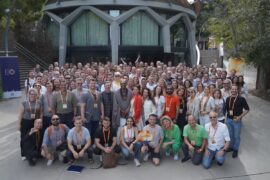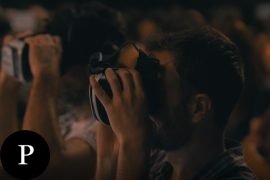
The hospital's managing director, Manel del Castillo, and the pharmaceutical...

On October 28th at 3 o'clock a.m. we rewinded the...

Entrepreneurs' Organization promotes entrepreneurship in community and from a holistic...

Jane Goodall travels the world 300 days a year asking...

The audiovisual sector has a motto that will always prevail:...

The Museu Marítim will host on October 28 the great...

A tree in the city is much more than ornamentation...

The twin-cherry brand, originally established in Sitges in 1967 and...

Who is primarily responsible for the so-called "greenhouse effect"? What...

Approved by the Executive Committee, the principles underscore gender equality...

Música clásica sobre la arena de la playa en dos...

The first session of the cycle on the regatta organized...

The hospital's managing director, Manel del Castillo, and the pharmaceutical...

Generalitat y Ayuntamiento impulsarán dos equipamientos de 'Casa de les...

Leticia Beleta, director of Alexion Pharmaceuticals in Spain and Portugal,...

We all have a friend who never leaves the Gràcia...

Barcelona director opts for Best International Film with 'La sociedad...

The hotel and industrial sectors softened the market's decline last...

The technology company, with a workforce of 35 employees and...

“The women of yesteryear were strong and had to fight...

In education, new technologies are often introduced as a magic solution of sorts: a panacea that, theoretically, could solve all the problems with hardly any cost or pain whatsoever. Realistically though, we must, not only question the role of new technologies on the learning process but we also should assess whether essential problems of our university education, far from being automatically solved on applying new technologies, have become the main obstacle towards making the most of the many facilities and services they can offer. Considering that the main objective of education, in general, and university, in particular, is teaching to think, we run the risk of exaggerating the effect of new technologies as the potential reason of radical change or as the main factor to solve problems. Instead, I believe that new technologies will have an impact only on certain areas, especially those focusing on knowledge acquisition and technical abilities. In this respect, it is no coincidence that online formation is being implemented in courses related to computer programming or accounting. On the other hand, new technologies less impact on the learner’s intellectual development, especially on areas involving learning to think, select and acquire knowledge.
Furthermore, new technologies will probably not make a remarkable impact on two of the basic functions of universities, i.e. producing informative “signs” for the work market and favouring the development of the students’ social skills. On the other hand, the efficiency of these signs requires rigorous assessment that, too often, distance and online learning find it difficult to develop. Alternatively, sociability requires the type of interaction that only on-site education can effectively provide. Presence and personal interaction may be more necessary as individuals tend to gain education in isolation or through technologically-mediated interactions. Admittedly though, new technologies favour a more “Socratic” education whereby class sessions are dedicated to discussing specific cases and problems, rather than to explaining conceptual or theoretical schemes. In view of this, there is likely to be, in the future, a radical evolution that will “turn classrooms around” (flipping the classroom), whereby most teaching time will be devoted to interacting and discussing, while masterclasses and exams will be mostly relegated to using online videos and online tests.
Nevertheless, on considering the extent, the likelihood and the specific universities that will implement this change, we must consider the poor global impact of video technology, and also this “change” was also possible, at least, since the invention of the press. Let us face it, the fiasco of the Bologna’s Plan, in that it constituted a shy attempt to flip over classrooms, is remarkable. In the absence of rigorous evaluation, one can anticipate that, in many respects, its only consequences have been that, apart from making teaching more expensive, it has also fragmented the courses and reduced both class hours and, probably, stricter standards. After year of implementation, lectures of such countries as Spain or France are similar to those offered before Bologna’s Plan, even before Gütenberg’s era. These facts should trigger a red alert over the existence of barriers, much more serious than those merely technological. Above all, the different mindframe of both Latin-culture teachers and students —should we say, perhaps, “culturally Catholic”?—, more willing to transmit and learn “the truth” than to discuss possible truths and learn to think, choose and build up truth for themselves. Surveys indicate that for a large number of Spanish university students, of all ideologies, their ideal lecturer figure is more akin to a preacher who transmits unquestionable truths, and the students’ task is limited to learning them. These students are reluctant to face risk and are happy to dedicate classroom time to introducing principles, instead of discussing them; they rarely participate in class discussions, and the assessment of their contribution to these discussions is often seen negatively; finally, the main exam material is often limited to notes taken in class.

Unsurprisingly, even academically proficient students face serious difficulties when processing written texts of some length. They even find it difficult to build up their own opinion, develop and defend arguments or criticize the others. Naturally, they find it difficult to participate in class and, in general, express their opinion. The reason for this is not difficulty in expressing themselves but their lack of opinion on these topics. This phenomenon comes to light when those students who are incapable of giving their own opinion in class are more expressive and efficiently argumentative whenever, for several reasons, they demand special treatment with respect to the rest of the class or, even, when they “revise” their exams —i.e. negotiating the mark with their teacher. Under such circumstances, they are extremely good negotiators and are highly capable of giving arguments that justifies their behaviour. In my opinion, they do not suffer from an expressive but a formative deficiency. Years of education of renegotiation rules with their parents has trained them to renegotiate everything for their own benefit. Years of cramming in notes has failed to train them to select and acquire information that enables them to build up their own opinion about reality. They are good manipulators yet bad analysts. In this respect, when evaluating the function of universities, maybe the main deficiency comes from applying theory to real-life cases and that students pass these exams successfully. When faced with real-life problems, they study and analyse it using the same tools as they used before entering university. On studying these problems, they only accumulate uncritically press news and, increasingly, the internet; instead, on analysing them, they often resort to common sense.
This model is just the more harmful as the corresponding discipline is less scientific, and, as a consequence, it is necessary to have a more open-minded and less dogmatic view. I suspect that this is the case both in economy and business administration and management. It is sad to see students in their senior year who, when facing economic problems —e.g. shortage or the cost of a specific product or service— lack the attitude and skills to tackle them from an economical viewpoint, and wonder —for example— what the prices or the opportunity costs are. The same goes for business students facing entrepreneurial and managerial cases. It is highly frustrating to see how, when facing these real-life situations, many highly qualified graduates are incapable of implementing effectively analytical tools, which they have proved to master in previous exams, especially those including practical answers.
All this happens even though it is clear that more Socratic-style teaching methodologies are called for, by virtue of which students delve into teaching materials before the class, and then the classes are dedicated to exploring, applying and discussing them. In doing that, the student will work in a different fashion. If this method works, it should help students fill gaps when they are adult, both at a technical and intellectual level. As regards the technical level, this methodology should make students capable of processing large amounts of information by choosing and selecting valuable and useful information, and expounding their ideas both in writing and in public. As regards the intellectual level, this methodology should encourage students build up their own opinion, instead of learning hard-and-fast recipes, and, essentially, making them implement theoretical knowledge to real-life problems.
Yet, there is one more general lesson to be learnt here: technological change opens up new oportunities but they only benefit those who have the conditions and the means to obtain them. For example, online courses make it possible to change university teaching radically. For many years, Harvard Business School have been subcontracting online teaching for its accounting courses —relatively mechanical— and both Harvard University and the MIT have invested enormous resources to develop online courses. Other universities, Spanish some of them, have shortly begun to do it on a small scale. Similarly, many of these courses are free to access. This facility allows students from all over the world to have direct access to the best teaching staff and optimal preparation.
All things considered, it is expected that this comparative advantage between our youngsters and those from Third World countries will disappear. Spanish graduates who have studied statistical methods used in handling, say Big Data, will have to compete against students from all over the world who have studied it online in the forest. This is already happening. We should be particularly wary about the recurrent excuse that youngsters are prepared to face the world on the grounds that they can use their mobile phones and laptops. A few weeks ago, a prominent Spanish politician confessed that his children, still young, were far ahead from him in technological issues. Big mistake. This widespread misconception in our country that youngsters are technologically adapted to information technology because they are capable of using skillfully mobile phones, tablets and computers, taking for granted their expertise on programming or, at least, searching information selectively. In fact, many of them —perhaps most of them?— do use them, essentially, to practise this funny old habit of gossiping through social networks. When, on top of that, they spend a substantial amount of their time on this activity, this can be considered as a case of “bad adaptation”, in terms of evolutionary biology. And this adaptation can be defined as “bad because, in this case, technology captures the willpower of these youngsters against their own long-term interest and turns them into addicts. This addition is becoming a serious problem because of the constant need of stimulation and non-stop communication of useless information, whose consumption gives immediate but short-lived pleasure in perpetuating old-fashioned instincts badly-adapted to the present. Confirmation of the importance of this issue comes from growing complaints of middle management, who find it difficult to get students to concentrate on some activity for a long period of time. Therefore, the excuse is both common and ill-founded.


In education, new technologies are often introduced as a magic solution of sorts: a panacea that, theoretically, could solve all the problems with hardly any cost or pain whatsoever. Realistically though, we must, not only question the role of new technologies on the learning process but we also should assess whether essential problems of our university education, far from being automatically solved on applying new technologies, have become the main obstacle towards making the most of the many facilities and services they can offer. Considering that the main objective of education, in general, and university, in particular, is teaching to think, we run the risk of exaggerating the effect of new technologies as the potential reason of radical change or as the main factor to solve problems. Instead, I believe that new technologies will have an impact only on certain areas, especially those focusing on knowledge acquisition and technical abilities. In this respect, it is no coincidence that online formation is being implemented in courses related to computer programming or accounting. On the other hand, new technologies less impact on the learner’s intellectual development, especially on areas involving learning to think, select and acquire knowledge.
Furthermore, new technologies will probably not make a remarkable impact on two of the basic functions of universities, i.e. producing informative “signs” for the work market and favouring the development of the students’ social skills. On the other hand, the efficiency of these signs requires rigorous assessment that, too often, distance and online learning find it difficult to develop. Alternatively, sociability requires the type of interaction that only on-site education can effectively provide. Presence and personal interaction may be more necessary as individuals tend to gain education in isolation or through technologically-mediated interactions. Admittedly though, new technologies favour a more “Socratic” education whereby class sessions are dedicated to discussing specific cases and problems, rather than to explaining conceptual or theoretical schemes. In view of this, there is likely to be, in the future, a radical evolution that will “turn classrooms around” (flipping the classroom), whereby most teaching time will be devoted to interacting and discussing, while masterclasses and exams will be mostly relegated to using online videos and online tests.
Nevertheless, on considering the extent, the likelihood and the specific universities that will implement this change, we must consider the poor global impact of video technology, and also this “change” was also possible, at least, since the invention of the press. Let us face it, the fiasco of the Bologna’s Plan, in that it constituted a shy attempt to flip over classrooms, is remarkable. In the absence of rigorous evaluation, one can anticipate that, in many respects, its only consequences have been that, apart from making teaching more expensive, it has also fragmented the courses and reduced both class hours and, probably, stricter standards. After year of implementation, lectures of such countries as Spain or France are similar to those offered before Bologna’s Plan, even before Gütenberg’s era. These facts should trigger a red alert over the existence of barriers, much more serious than those merely technological. Above all, the different mindframe of both Latin-culture teachers and students —should we say, perhaps, “culturally Catholic”?—, more willing to transmit and learn “the truth” than to discuss possible truths and learn to think, choose and build up truth for themselves. Surveys indicate that for a large number of Spanish university students, of all ideologies, their ideal lecturer figure is more akin to a preacher who transmits unquestionable truths, and the students’ task is limited to learning them. These students are reluctant to face risk and are happy to dedicate classroom time to introducing principles, instead of discussing them; they rarely participate in class discussions, and the assessment of their contribution to these discussions is often seen negatively; finally, the main exam material is often limited to notes taken in class.

Unsurprisingly, even academically proficient students face serious difficulties when processing written texts of some length. They even find it difficult to build up their own opinion, develop and defend arguments or criticize the others. Naturally, they find it difficult to participate in class and, in general, express their opinion. The reason for this is not difficulty in expressing themselves but their lack of opinion on these topics. This phenomenon comes to light when those students who are incapable of giving their own opinion in class are more expressive and efficiently argumentative whenever, for several reasons, they demand special treatment with respect to the rest of the class or, even, when they “revise” their exams —i.e. negotiating the mark with their teacher. Under such circumstances, they are extremely good negotiators and are highly capable of giving arguments that justifies their behaviour. In my opinion, they do not suffer from an expressive but a formative deficiency. Years of education of renegotiation rules with their parents has trained them to renegotiate everything for their own benefit. Years of cramming in notes has failed to train them to select and acquire information that enables them to build up their own opinion about reality. They are good manipulators yet bad analysts. In this respect, when evaluating the function of universities, maybe the main deficiency comes from applying theory to real-life cases and that students pass these exams successfully. When faced with real-life problems, they study and analyse it using the same tools as they used before entering university. On studying these problems, they only accumulate uncritically press news and, increasingly, the internet; instead, on analysing them, they often resort to common sense.
This model is just the more harmful as the corresponding discipline is less scientific, and, as a consequence, it is necessary to have a more open-minded and less dogmatic view. I suspect that this is the case both in economy and business administration and management. It is sad to see students in their senior year who, when facing economic problems —e.g. shortage or the cost of a specific product or service— lack the attitude and skills to tackle them from an economical viewpoint, and wonder —for example— what the prices or the opportunity costs are. The same goes for business students facing entrepreneurial and managerial cases. It is highly frustrating to see how, when facing these real-life situations, many highly qualified graduates are incapable of implementing effectively analytical tools, which they have proved to master in previous exams, especially those including practical answers.
All this happens even though it is clear that more Socratic-style teaching methodologies are called for, by virtue of which students delve into teaching materials before the class, and then the classes are dedicated to exploring, applying and discussing them. In doing that, the student will work in a different fashion. If this method works, it should help students fill gaps when they are adult, both at a technical and intellectual level. As regards the technical level, this methodology should make students capable of processing large amounts of information by choosing and selecting valuable and useful information, and expounding their ideas both in writing and in public. As regards the intellectual level, this methodology should encourage students build up their own opinion, instead of learning hard-and-fast recipes, and, essentially, making them implement theoretical knowledge to real-life problems.
Yet, there is one more general lesson to be learnt here: technological change opens up new oportunities but they only benefit those who have the conditions and the means to obtain them. For example, online courses make it possible to change university teaching radically. For many years, Harvard Business School have been subcontracting online teaching for its accounting courses —relatively mechanical— and both Harvard University and the MIT have invested enormous resources to develop online courses. Other universities, Spanish some of them, have shortly begun to do it on a small scale. Similarly, many of these courses are free to access. This facility allows students from all over the world to have direct access to the best teaching staff and optimal preparation.
All things considered, it is expected that this comparative advantage between our youngsters and those from Third World countries will disappear. Spanish graduates who have studied statistical methods used in handling, say Big Data, will have to compete against students from all over the world who have studied it online in the forest. This is already happening. We should be particularly wary about the recurrent excuse that youngsters are prepared to face the world on the grounds that they can use their mobile phones and laptops. A few weeks ago, a prominent Spanish politician confessed that his children, still young, were far ahead from him in technological issues. Big mistake. This widespread misconception in our country that youngsters are technologically adapted to information technology because they are capable of using skillfully mobile phones, tablets and computers, taking for granted their expertise on programming or, at least, searching information selectively. In fact, many of them —perhaps most of them?— do use them, essentially, to practise this funny old habit of gossiping through social networks. When, on top of that, they spend a substantial amount of their time on this activity, this can be considered as a case of “bad adaptation”, in terms of evolutionary biology. And this adaptation can be defined as “bad because, in this case, technology captures the willpower of these youngsters against their own long-term interest and turns them into addicts. This addition is becoming a serious problem because of the constant need of stimulation and non-stop communication of useless information, whose consumption gives immediate but short-lived pleasure in perpetuating old-fashioned instincts badly-adapted to the present. Confirmation of the importance of this issue comes from growing complaints of middle management, who find it difficult to get students to concentrate on some activity for a long period of time. Therefore, the excuse is both common and ill-founded.

